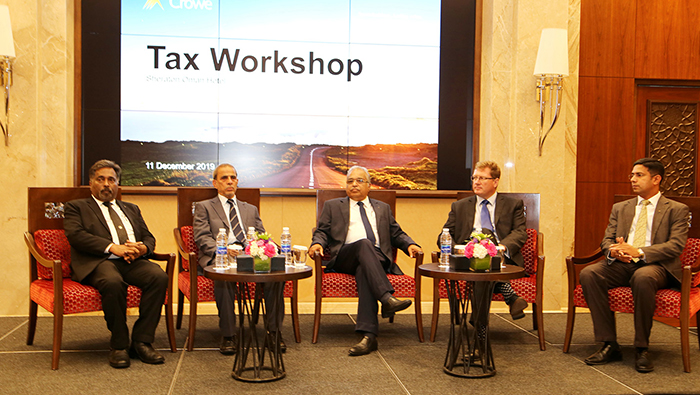
Muscat: Tax is complicated legislation worldwide and paying tax makes it tougher, however, in Oman, the tax law is simple, Davis Kallukaran, managing partner of Crowe Oman said while welcoming the delegates to the tax workshop organised by Crowe on Wednesday.
The scope of withholding tax was widened by tax law made by Royal Decree 9/2017 to cover, certain payments like fees for services, dividends from joint stock companies and interest payments made to foreign companies and persons.
The highlight of the workshop was the relief that taxpayers were given using Executive Regulations (ER) recently. Tax managers, finance managers and finance executives of many Omani and foreign companies participated in the workshop.
"During the last two weeks, two major headlines in the Oman newspapers captured my attention. The first one was that the Omani budget deficit has come down by 20 per cent in the last nine months of this year to OMR1.5 billion," Davis said in his address.
"Out of the total revenue, 10 per cent, ie almost OMR800 million is contributed by custom duty and corporate taxes. Corporate tax collection has gone up by around 25 per cent in the past nine months to touch OMR580million and another OMR162 million from custom duty," he added.
"There has not been any change in the corporate rate in the last two years. In spite of the economic slowdown, the increase in tax collection is only due to the tightening of tax administration. The mindset of tax collectors have changed in the recent past. The skillset of the people have increased significantly and scores of queries are being raised before an assessment is completed unlike in the past," Davis said.
The government is also tightening the corners and a new tax authority has been formed. Preparations are on the way to introduce a value-added tax (VAT) regime by the last quarter of 2020 or early 2021.
The second headline in the newspapers was the signing of the OECD BEPS multinational convention by the sultanate. This is a significant milestone in history. The Organisation of Economic Development and Cooperation (OECD) has drafted the Base Erosion and Profit Shifting (BEPS) multilateral convention.
"By signing the convention the countries agree for exchange of financial information of its residents to monitor money laundering and terrorism funding activities or shifting tax residences to escape tax through various permutations and combinations," he said.
"To a great extent, signing of this convention will bring about strict measures to prevent undesirable transfer pricing and money laundering activities," Davis concluded.
The annual tax workshop was organised by Crowe to bring the attention of the general public to the pitfalls one should be aware of in handling their tax matters.
Sridhar, one of the architects of Oman taxation and tax advisor at Crowe Oman, Ramya Annadurai, tax director and Aastha Rangan, Director VAT practice conducted simulation exercises to practically bring in various aspects of the tax administration.
Later Markus Susilo, regional head, indirect taxes Crowe Middle East talked on the multilateral convention on OECD BEPS signed by the Sultanate recently.